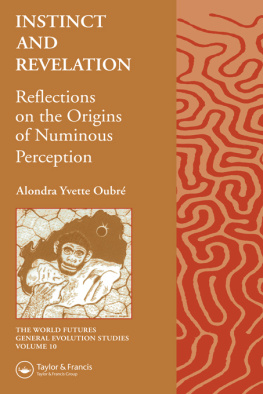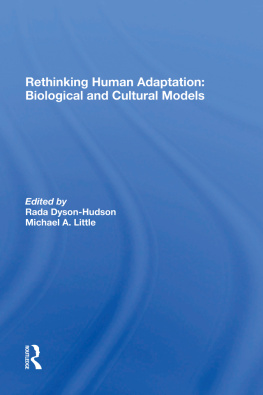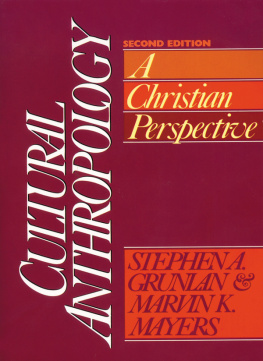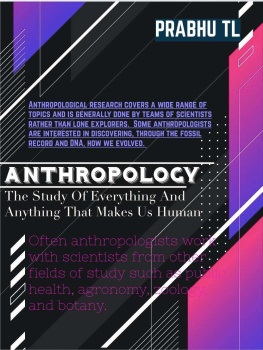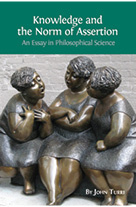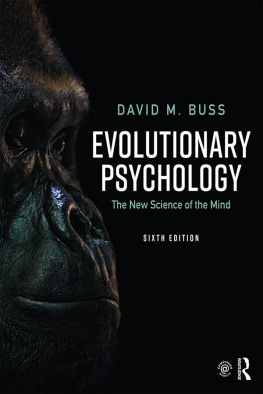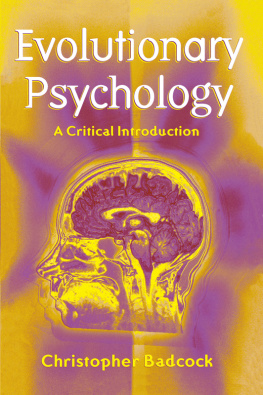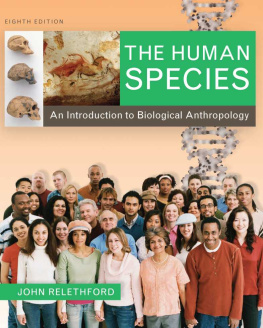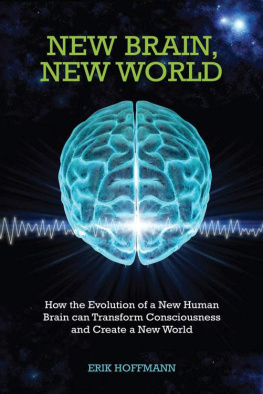Instinct and Revelation
THE WORLD FUTURES GENERAL EVOLUTION STUDIES
A series edited by Ervin Laszlo
The General Evolution Research Group
The Academy for Evolutionary Management and Advanced Studies, Fulda, Germany
VOLUME 1
NATURE AND HISTORY: THE EVOLUTIONARY APPROACH FOR SOCIAL SCIENTISTS
Ignazio Masulli
VOLUME 2KEYNOTE VOLUME
THE NEW EVOLUTIONARY PARADIGM
Edited by Ervin Laszlo
VOLUME 3
THE AGE OF BIFURCATION: UNDERSTANDING THE CHANGING WORLD
Ervin Laszlo
VOLUME 4
COOPERATION: BEYOND THE AGE OF COMPETITION
Edited by Allan Combs
VOLUME 5
THE EVOLUTION OF COGNITIVE MAPS: NEW PARADIGMS FOR THE TWENTY-FIRST CENTURY
Edited by Ervin Laszlo and Ignazio Masulli with Robert Artigiani and Vilmos Csayi
VOLUME 6
THE EVOLVING MIND
Ben Goertzel
VOLUME 7
CHAOS AND THE EVOLVING ECOLOGICAL UNIVERSE
Sally J. Goerner
VOLUME 8
CONSTRAINTS AND POSSIBILITIES: THE EVOLUTION OF KNOWLEDGE AND THE KNOWLEDGE OF EVOLUTION
Mauro Ceruti
VOLUME 9
EVOLUTIONARY CHANGE: TOWARD A SYSTEMIC THEORY OF DEVELOPMENT AND MALDEVELOPMENT
Aron Katsenelinboigen
VOLUME 10
INSTINCT AND REVELATION: REFLECTIONS ON THE ORIGINS OF NUMINOUS PERCEPTION
Alondra Yvette Oubr
This book is part of a series. The publisher will accept continuation orders which may be cancelled at any time and which provide for automatic billing and shipping of each title in the series upon publication. Please write for details.
Copyright 1997 OPA (Overseas Publishers Association) Amsterdam B.V.
Published by Taylor & Francis
2 Park Square, Milton Park, Abingdon, Oxon, OX14 4RN
270 Madison Ave, New York NY 10016
Transferred to Digital Printing 2007
All rights reserved.
No part of this book may be reproduced or utilized in any form or by any means, electronic or mechanical, including photocopying and recording, or by any information storage or retrieval system, without permission in writing from the publisher. Printed in India
Graphics in the appendices of this book by David Templeton and Victor Boardman.
British Library Cataloguing in Publication Data
Oubr, Alondra Yvette
Instinct and revelation: reflections on the origins of
numinous perception. (World futures general evolution
studies ; v. 10)
1. Consciousness Religious aspects 2. Brain Evolution
Religious aspects
I. Title
155.7
ISBN 90-5699-528-6
Publishers Note
The publisher has gone to great lengths to ensure the quality of this reprint but points out that some imperfections in the original may be apparent
To Dyke Brown , founder of the Athenian School, and to the memory of his wife Kate Brown
Contents
The World Futures General Evolution Studies series is associated with the journal World Futures: The Journal of General Evolution. It provides a venue for monographs and multiauthored book-length works that fall within the scope of the journal. The common focus is the emerging field of general evolutionary theory. Such works, either empirical or practical, deal with the evolutionary perspective innate in the change from the contemporary world to its foreseeable future.
The examination of contemporary world issues benefits from the systematic exploration of the evolutionary perspective. This happens especially when empirical and practical approaches are combined in the effort.
The World Futures General Evolution Studies series and journal are the only internationally published forums dedicated to the general evolution paradigms. The series is also the first to publish book-length treatments in this area.
The editor hopes that the readership will expand across disciplines where scholars from new fields will contribute books that propose general evolution theory in novel contexts.
For more than three centuries, physical and natural scientists alike have generated extensive observational and empirical evidence demonstrating the physical principles embodied in the concept of transformation of energy. One might easily argue that nowhere in contemporary science is this principle more elaborately portrayed than in the perpetual transformational process of biological evolution. The work of Mendel, Linnae, Darwin and countless others provided a framework of systematic thought that led to our understanding of the origins of the diversity of living things on the planet. Evolution tells us that the perpetuation of a species is dependent upon its malleability and adaptability to a changing environment. Molecular genetics has shown us the mechanisms by which such adaptability occurs, and how changes at the molecular level of the cell result in modifications in the physical capabilities and malleable capacities of organisms to thrive, survive or die in response to a world that is forever in transition.
The cognitive maps of science and the cumulative accomplishments present today that bear their fruit are a testament to the means by which the many disciplines of science have contributed to the well-being of members of a mlange of cultures comprising the human community. Paradoxically, however, the knowledge of the physical world in which we live knowledge generated by scientific inquiry is a two-edged sword, a Pandoras box. For example, contemporary technology permits us to witness, in real-time, live images of human atrocities that take place sometimes thousands of miles away, while we are simultaneously helpless to stop them because they occur outside of our immediate locale. Central to this irony is consciousness.
Consciousness encompasses a progressively expanding dimension ranging from the microcosm of the individual awareness of self, to awareness of the impact of the action, thought and behavior of the self on its environment, to the more collective cultural macrocosm of the greater human self a collective consciousness. Traditionally categorized as a fundamental feature of mind, the issue of consciousness its origins, structure, even its very existence is a subject which empirical science still cannot comfortably explore. By its very nature, consciousness is subjective and therefore does not easily lend itself to scientific inquiry. However, the reality of consciousness is undeniable to the scientist. Even Descartes The necessity of such an investigative task thus becomes obvious, and is the deeper message of this book.
Instinct and Revelation is Dr. Oubrs attempt to weave a rationale though speculative scheme that presents human consciousness and its evolution as a biological imperative. Based on knowledge available from such varied disciplines as anthropology, evolutionary biology and ecology, genetics, pharmacology, psychiatry, psychology and the neurosciences, she develops the premise that consciousness is the result of natural selection and that once it appeared, it influenced the general course of hominid evolution and the development of the brain of Homo sapiens sapiens.
Only recently have several scientific disciplines seriously given the issue of consciousness much attention.
Only time will reveal whether the information contained in the pages of this volume provides an answer to the question posed by William James more than a century ago why we as Homo sapiens sapiens have evolved a brain that makes consciousness possible. and hold the potential for a greater human good. The consciousness of transcendence is one of unity a consciousness with conscience. Science is currently on the verge of becoming fully capable of identifying and manipulating the human genome. A knowledge and appreciation of consciousness combined with respect for the ethics of science and responsibility for upholding ethical research will be crucial aspects of our collective character if our species and others are to be safe from disaster during this epoch of transformation in a brave new world.

